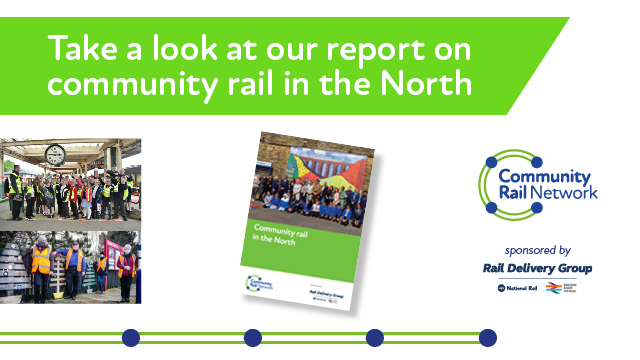
Members of a grassroots rail movement have continued to strive for England’s northern communities and work towards a greener transport future, despite the pandemic, and are looking forward to supporting local recovery.
Figures from Community Rail Network’s Community Rail in the North report – sponsored by Rail Delivery Group – released today (24 March) highlight that more than 3,000 volunteers give 140,000 hours annually to support social inclusion, sustainable and healthy travel, wellbeing, economic development, and tourism in their local area, valued at £11.7 million.
Making up 20 community rail partnerships and 350 station groups from across Northern England – from the Tyne Valley in Northumberland to Crewe in Cheshire – they engage local people with their railways and stations, working with train operators, local authorities, and other partners.
Across the North, groups are involved in community gardening, food growing and biodiversity projects on station land; the creation of heritage boards or community artwork to help people learn about and take pride in their area; volunteering at stations to create a safe and attractive environment for passengers; work with rail industry partners towards improvements, such as better shelters, signage or pedestrian and cyclist access; and running events, workshops and activities to promote sustainable travel, bring people together, and celebrate the local community.
Community rail across the North is now looking forward to playing a pivotal role in building back better from Covid, and helping our railways to be a vital component of a greener, more inclusive way forward as part of a ‘green recovery’.
Community rail in action across the North:
Many community rail partnerships and volunteers have helped to support communities during the pandemic. Volunteers at St Anne’s Station on the South Fylde Line swung into action to make much-needed scrubs and bags for their local Blackpool Victoria Hospital, medical centres and care homes. Many community rail partnerships used their local knowledge and connections to support services for key workers and ensure essential travel was safe during the pandemic, including the Bishop Line Partnership, who gave out free face coverings for passengers.
Tyne Valley Community Rail Partnership has been striving to understand barriers to rail use and sustainable travel, particularly among groups with additional needs. Working with a special school and two charities supporting adults with learning difficulties and isolation issues, they ran song writing sessions to explore views on rail travel through music, with each group writing and recording an original song that identified the challenges and joys of rail travel. The findings allowed the partnership to set objectives to reduce barriers and feed in ideas to rail partners.
In West Yorkshire, ‘Action Stations Bingley and Crossflats’ have been transforming a disused patch of land at Bingley into a Five Rise Locks-themed garden, celebrating the Leeds Liverpool Canal. They have established an Incredible Edibles project, with planters on the platforms filled with veg and herbs, funded by the town council, for the community to help themselves and encourage people to have a go at growing produce. The group has also set up a book swap scheme, new signage to promote local tourism, and a Finger Spelling project to aid inclusion of the deaf community.
The Friends of Buxton Station are now working to support local regeneration post-COVID, through the ‘Buxton Kickstart’ recovery campaign and have developed a Rail Retail Trail to support small businesses and boost the local economy.
Meanwhile, Community Rail Lancashire has continued to pioneer railway-based education and confidence-building projects, engaging with local schools and community partners and sharing good practice across the community rail movement. To date, the partnership has engaged more than 5,000 children from around 100 schools, including primary, secondary, and special schools.
Jools Townsend, chief executive of Community Rail Network, said: “Community rail works to make our railways community-minded and inclusive, and promotes sustainable travel by rail, bringing people together and bolstering local pride and wellbeing. In the North, community rail partnerships and groups have adapted and responded, supporting communities through the pandemic, maintaining positivity, and advising rail partners on shifting local needs.
“As we start to rebuild from Covid-19, within the community rail movement, and across our railways, we will be redoubling efforts, to create confidence and togetherness, and play our part in enabling more people to get around by socially and environmentally responsible means. Community rail is all about communities and connectedness, and people working together locally to make things better for each other and our shared future – that couldn’t be more important right now.”
Robert Nisbet, director of nations and regions at the Rail Delivery Group, said: “The railway is at the heart of local communities and the fantastic initiatives by community rail volunteers in the North play to its strengths, connecting people up and down the country. As we recover from the pandemic, getting more people back on trains will be vital to boost local economies and the environment, so the support of community rail will be more important than ever.”
Carolyn Watson, Community and Sustainability Director at Northern Rail, said, “Community groups on the Northern network have always been at the forefront of community engagement. An increasing number of communities and individuals are benefiting from initiatives and projects that break down barriers, foster a more inclusive society, and build foundations for a more sustainable future.”
